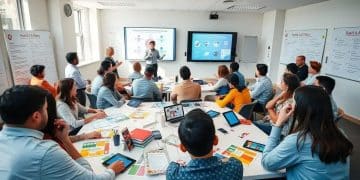Insights on financial literacy campaigns to empower you

Effective financial literacy initiatives enhance money management skills through community engagement, clear assessment metrics, participant feedback, and ongoing education, fostering financial confidence and independence.
When it comes to managing your money, insights on financial literacy campaigns can offer valuable guidance. Have you ever wondered how these campaigns influence your spending habits? Let’s dive in and discover the power they hold!
Understanding the importance of financial literacy
Understanding the importance of financial literacy is essential for everyone, regardless of age or background. By grasping the concepts of managing money, individuals can make informed decisions that positively impact their lives. It equips people with skills to budget, save, and invest wisely.
Why Financial Literacy Matters
Being financially literate means knowing how money works. It helps individuals navigate complex financial situations. People who understand finances often feel more secure in their choices.
Key Benefits of Financial Literacy
- Confidence in making financial decisions
- Ability to avoid debt traps
- Enhanced savings and investment strategies
- Better preparedness for emergencies
By promoting financial literacy campaigns in communities, we can foster an environment where people learn essential skills. These skills are vital for achieving financial stability and independence.
Additionally, financial literacy can play a crucial role in reducing poverty levels. When people understand how to manage their money effectively, they can aspire to improve their living conditions. Financial education offers tools that empower individuals to break free from cycles of debt and dependence.
Engaging programs that teach budgeting, investing, and saving help bridge the knowledge gap. The more informed a person is, the more likely they are to maximize their resources. Education leads to better financial outcomes.
Community Involvement in Financial Literacy
Communities can foster financial literacy by supporting local initiatives and workshops. These events create opportunities for individuals to learn from experts and share experiences. When communities participate, the collective understanding of financial responsibilities improves significantly.
Effective strategies for financial literacy campaigns

Effective strategies for financial literacy campaigns can empower individuals and communities. These campaigns aim to teach crucial financial skills that help people manage their money wisely.
Engaging Educational Workshops
Workshops are one of the best ways to reach various audiences. They provide hands-on learning experiences. For instance, discussions about budgeting and saving can make complex ideas simpler.
- Interactive sessions with real-life scenarios
- Involvement of financial experts for credibility
- Utilizing multimedia tools like videos and slides
Integrating activities, such as role-playing, makes financial concepts memorable. When participants can practice what they’ve learned in a safe environment, they feel more confident applying these lessons in their own lives.
Leveraging Technology and Social Media
In today’s digital world, technology plays a significant role in spreading knowledge. Utilizing social media platforms can expand the reach of financial literacy campaigns.
Creating shareable content, such as infographics and short videos, helps engage a broader audience. People are more likely to share helpful tips they find online. This sharing promotes a culture of learning among peers.
Moreover, mobile apps that offer budgeting tools and financial advice can also improve financial literacy. Accessible resources encourage individuals to take charge of their finances while learning at their own pace.
Community Collaboration and Partnerships
Partnering with local organizations can enhance the effectiveness of financial literacy campaigns. These collaborations can provide important networks and resources.
- Working with schools to integrate financial education into curriculums
- Collaboration with local businesses to sponsor events
- Combining resources with non-profits focused on financial education
When communities come together, they build a supportive environment for learning. This unity strengthens the message of financial empowerment.
The role of community in promoting financial education
The role of community in promoting financial education is vital for enhancing the financial literacy of individuals. When communities come together, they can create a supportive environment that fosters learning about money management.
Creating Local Programs
Communities can start by organizing local programs that focus on financial education. These programs often include workshops and seminars that provide valuable information. Residents can learn about budgeting, saving, and investing through engaging sessions led by financial experts.
- Hosting regular community events focused on financial skills
- Providing resources like books and online materials
- Encouraging local leaders to promote financial learning
Engaging activities make learning fun and memorable. When people participate actively, they are more likely to retain the information shared.
Partnerships with Local Organizations
Another effective strategy involves forming partnerships with local organizations. Schools, libraries, and non-profits can collaborate to enhance financial education initiatives.
These organizations can pool resources to reach a wider audience. For example, schools can integrate financial literacy into their curricula, while libraries can offer workshops for adults. This joint effort increases access to knowledge and encourages community pride.
Local businesses can also play a significant role. By sponsoring education events or providing incentives for participation, they demonstrate their commitment to the financial well-being of the community. This involvement builds trust and strengthens relationships.
Utilizing Social Media and Local Networks
Today, social media is a powerful tool for spreading awareness. Communities can utilize platforms like Facebook and Instagram to share tips and resources on financial education. Online groups can function as support systems where individuals exchange ideas and experiences.
- Creating engaging content to attract attention
- Encouraging sharing of personal success stories
- Hosting live Q&A sessions with financial experts
Additionally, local networks provide a platform for individuals to engage with each other. When community members connect, they can motivate and support one another in their financial journeys. Building these connections encourages learning and accountability.
Measuring the success of financial literacy initiatives

Measuring the success of financial literacy initiatives is crucial to ensure they are effective. By evaluating these programs, communities can understand their impact and make necessary adjustments for improvement.
Key Performance Indicators (KPIs)
Establishing clear KPIs allows organizations to assess the effectiveness of their initiatives. Common KPIs include changes in financial behavior, engagement levels, and participant feedback.
- Tracking the number of participants in workshops
- Measuring improvement in budgeting skills through surveys
- Analyzing post-program financial knowledge assessments
These indicators provide valuable insights into how well the initiative meets its goals. Continuous assessment helps in refining strategies to maximize educational outcomes.
Participant Feedback and Surveys
Gaining feedback from participants is essential for understanding their experiences. Conducting surveys after programs can reveal valuable insights.
Questions may focus on what participants learned and how they plan to apply the knowledge. Feedback helps identify strengths and areas needing improvement, creating an ongoing cycle of learning.
Individuals may express how they feel more confident managing their finances after participating. This qualitative data can complement quantitative measurements, providing a more comprehensive view of success.
Long-term Impact and Follow-Up
To truly measure success, it’s important to assess the long-term impact of financial literacy initiatives. Follow-up surveys can help determine if participants successfully implemented their skills over time.
- Tracking participants’ financial behaviors months after completion
- Assessing their progress toward financial goals
- Identifying continued need for additional resources or support
Such assessments show how financial knowledge translates into real-world benefits. When individuals can manage their money effectively over the long haul, it demonstrates the initiative’s true value.
In conclusion, effective financial literacy initiatives can empower individuals and communities. By actively engaging communities, measuring success through clear indicators, and utilizing feedback, programs can continue to improve. Collaborations with local organizations and ongoing education are essential. Together, these strategies lead to greater financial awareness and better money management skills.
FAQ – Frequently Asked Questions about Financial Literacy Initiatives
What are key performance indicators (KPIs) for financial literacy initiatives?
KPIs can include participant engagement, improvements in budgeting skills, and feedback from surveys to assess the effectiveness of the initiative.
How can feedback improve financial literacy programs?
Feedback helps identify areas of strength and weakness, allowing programs to adjust and better meet the needs of participants.
Why is community collaboration important for financial literacy?
Collaboration with local organizations expands the reach of programs, enhances resource sharing, and builds a supportive network for participants.
What ongoing support is available after financial literacy programs?
Follow-up initiatives, workshops, and online resources provide continued education and support to help individuals apply their financial skills.





